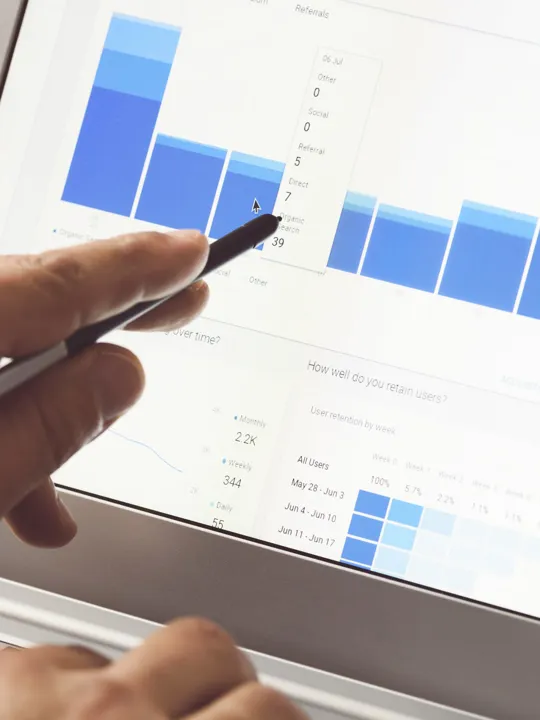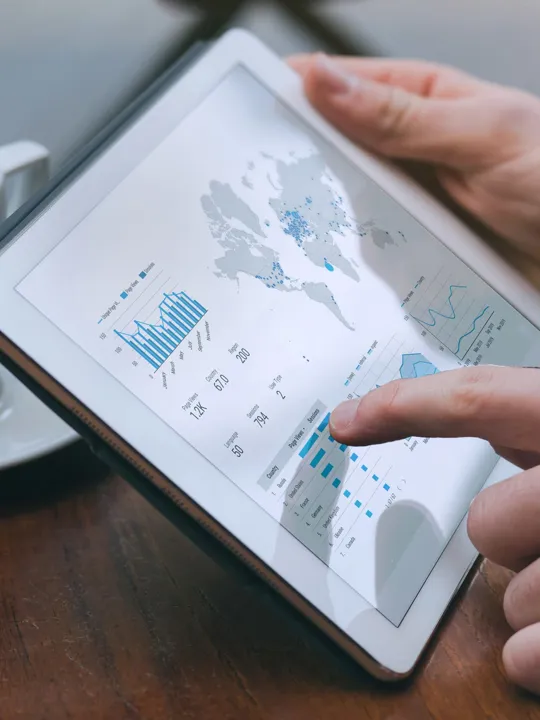GA4 for Hospitality Marketing
In the hospitality industry, data-driven marketing is paramount. Understanding guest behaviour and preferences allows hotels, restaurants and other hospitality businesses to optimise marketing strategies, improve guest experiences, and drive more bookings.
As the latest version of Google Analytics, GA4 is designed to offer deeper, more nuanced insights into how guests interact with your website and digital platforms. With its advanced tracking capabilities and event-based data model, GA4 provides a comprehensive view of the customer journey, helping to identify key touchpoints, analyse user behaviour, and make informed decisions that lead to higher conversions and better guest satisfaction.
By utilising GA4, businesses can refine their strategies to better target potential guests, track the effectiveness of marketing campaigns, and uncover new growth opportunities. With its ability to track users across devices and platforms, GA4 is an essential tool for all businesses and we’re going to tell you a little bit more about it, how it works, and some benefits and drawbacks.
What is GA4?
GA4 is Google’s next generation analytics platform, designed to provide deeper insights into user behaviour across both websites and apps. Unlike its predecessor, Universal Analytics, which relied heavily on session-based data, GA4 uses an event-driven data model, allowing businesses to track and analyse individual user interactions in a more detailed and flexible way. This makes it particularly valuable for hospitality businesses that need to understand how guests interact with their websites or mobile apps, from browsing rooms to completing bookings.
Why the Shift from Universal Analytics?
The shift from Universal Analytics to GA4 is driven by the need for more accurate, comprehensive data in an increasingly mobile world. Universal Analytics primarily focused on sessions and page views, which limited its ability to track user journeys across multiple devices. In contrast, GA4’s event-based model allows you to track specific actions like clicks, scrolls, and form submissions. This makes it easier to follow a user’s entire journey, whether they switch from mobile to desktop or interact with multiple touch points along the way.
Another key difference is GA4’s cross-device tracking capabilities. In Universal Analytics, tracking users across different devices was often inconsistent. GA4, however, is designed to provide a more seamless view of the customer journey, making it ideal for hospitality marketers who need to understand how users move between devices when researching or booking accommodations.
Additionally, GA4 includes more robust data privacy and compliance features, including support for cookieless tracking and better integration with Google’s machine learning capabilities.

Key Features of GA4 for Hospitality Marketing
GA4 brings a range of features tailored to the needs of hospitality marketers, providing deeper insights into guest interactions and allowing for more strategic decision making. Below we’ve included some ways GA4 can be leveraged effectively for hospitality marketing:
Event-based tracking
GA4 moves away from the traditional focus on sessions and page views and instead tracks events, which are specific actions users take on a website or app. This means that marketers can now track highly specific guest interactions such as clicks on booking forms, the download of digital brochures, or engagement with amenities pages. By focusing on these granular events, GA4 can help you to better understand guest preferences, identify where users are dropping off in the booking process, and optimise your websites for more conversions.
Cross-device tracking
One of GA4’s most valuable features is its ability to track users across devices, providing a unified view of the customer journey. For the hospitality industry in particular, where guests may browse on their smartphones but complete bookings on desktops, this is crucial. GA4’s cross-device tracking offers a complete picture of how guests interact with their brand from one device to another, allowing for a more comprehensive understanding of guest behaviour and better targeting of marketing efforts based on multi-device usage.
Predictive Metrics
GA4 leverages machine learning to offer predictive insights that can help forecast guest behaviour. Metrics like churn probability and purchase probability allow you to identify guests who are at risk of not returning or those likely to make a booking. This insight enables hotels and resorts, for example, to take proactive steps, such as sending personalised offers to at-risk guests or upselling services like spa packages to guests who are likely to purchase. By predicting guest behaviour, your business can make more informed marketing decisions and improve revenue.
Custom reporting
Unlike Universal Analytics, GA4 offers more flexibility with custom reporting, allowing users to create reports that align with specific goals. You can track KPIs such as room bookings, occupancy rates, and time spent on key pages like wedding venues or dining options. With the ability to create custom funnels and segments, GA4 helps businesses drill down into the exact data they need to make informed decisions, offering a deeper understanding of guest behaviour and marketing performance. A win-win!
What Can Be Tracked with GA4?
GA4 offers powerful tracking capabilities that allow users to gain a deeper understanding of guest behaviour and the overall performance of their digital efforts. Here are some of the key elements that can be tracked using GA4:
Guest engagement
GA4 enables hospitality marketers to track specific guest interactions, such as clicks on room categories, special offers, and CTA buttons for inquiries or bookings. This level of detail allows businesses to understand which pages and offers are most engaging for users, helping to optimise website content and design for better conversion rates. You can see how guests are interacting with the site, whether they are clicking on a discount package, exploring room options, or downloading brochures, and adjust strategies based on these insights.
Conversion paths
With GA4, hospitality businesses can track the entire guest journey, from the initial interaction to booking completion. By analysing conversion paths, we can see which steps users take before making a booking and identify potential drop off points where guests abandon the process. This allows you to pinpoint and address any barriers to conversion, such as overly complex forms or unclear messaging, improving the likelihood of bookings being completed.
Marketing campaign performance
GA4 provides detailed insights into how marketing campaigns perform across channels like email, social media, and Google Ads. You can measure how effective these campaigns are in driving traffic to your site, and more importantly, how many of these visitors convert into bookings or inquiries. By tracking the impact of individual campaigns, hospitality marketers can allocate budgets more effectively and focus on strategies that generate the most bookings.
Revenue tracking
For hotels and resorts that use e-commerce capabilities on their websites, GA4’s revenue tracking allows them to monitor the exact revenue generated from online bookings, upgrades, and other services. This includes tracking room bookings, spa appointments, dining reservations, and other add-ons, giving a comprehensive view of the total revenue generated by the website. By tying revenue to specific guest interactions or marketing campaigns, businesses can identify high-performing segments and promotions that boost income.
How to Use GA4 for Hospitality Marketing
GA4 offers a wide range of features that can significantly improve how hospitality businesses understand guest behaviour and optimise their marketing strategies. Here are some key ways to leverage GA4 for hospitality marketing:
Optimising website performance
GA4 provides detailed insights into how different pages on your website are performing, helping you identify areas that may be underperforming. For example, if your room pages have high bounce rates or low engagement, GA4 can help you pinpoint these issues. You can track user behaviour to see where guests are dropping off and make targeted optimisations (such as improving page load times, simplifying the booking process, or enhancing room descriptions) to keep users engaged and increase conversions.
Refining targeting strategies
GA4’s audience-building feature allows you to create segments based on user behaviour, demographics, or interests. For example, you can segment guests who frequently visit your spa page but have yet to book a service or those who have previously booked dining reservations. By refining your audience segments, you can tailor your ad campaigns to specific groups of users, increasing the likelihood of bookings or upsell opportunities like spa packages or dining reservations. This targeted approach ensures that your marketing efforts are reaching the right people with personalised offers that are more likely to convert.
Tracking cross-platform guest journeys
As mentioned above, one of the standout features of GA4 is its ability to track guests across devices, offering a complete view of how users interact with your business from mobile, tablet, and desktop. This is particularly valuable for hospitality businesses, as guests often browse on mobile devices but might complete bookings on another device at a later date. By tracking these cross-platform journeys, you can better understand where and how to engage guests at different stages of their decision making process.

Benefits of GA4 for Hospitality Marketing
GA4 offers a range of powerful benefits that allow users to better understand guest behaviour, optimise marketing strategies, and improve overall performance.
Deeper customer insights
GA4 provides a comprehensive view of how guests interact with your brand across multiple touchpoints, from the moment they discover your website or app to when they complete a booking. By tracking user journeys across devices and platforms, GA4 helps users understand the full customer experience, allowing for more informed decision-making. This holistic view of the guest journey can highlight key moments that drive bookings and engagement, helping you decide what works best.
Enhanced tracking of guest behaviour
With GA4’s event-based tracking, you can monitor micro-conversions, such as newsletter signups, inquiries, and brochure downloads. These smaller interactions provide valuable insights into where guests are in their decision making process, which means you can tailor your marketing strategies to target guests at the right time, offering personalised incentives to encourage bookings or further engagement.
Improved attribution
GA4’s enhanced attribution model allows users to better understand which marketing channels drive the most valuable traffic and conversions. By analysing data from Google Ads, social media campaigns, and email marketing efforts, businesses can determine which channels generate the most revenue or lead to the highest number of bookings. This deeper attribution insight helps optimise marketing budgets, ensuring that resources are allocated to the most effective channels, driving a higher ROI.
Cost efficiency
One of the key benefits of GA4 is that it is free to use, providing access to detailed analytics and insights without the need for costly analytics software. This cost-efficient platform allows hospitality businesses to gain valuable data on guest behaviour, marketing performance, and revenue tracking without investing in expensive third-party tools. By using GA4, you can reduce some costs while still accessing advanced tracking features that drive better marketing decisions.
Potential Drawbacks of GA4
Obviously, we’ve spoken a lot about the positives of GA4 and what it offers businesses, however, it is also important to consider some of the potential drawbacks.
Learning curve
GA4’s interface and functionality differ from Universal Analytics, which can make the transition challenging for those accustomed to the old platform. The new tracking model, customised reporting features, and complex data configurations require time and training to master. As a result, some users may face a steep learning curve before they can fully leverage the tool’s capabilities and make the most of GA4.
Custom setup
While GA4 offers more customisation options than Universal Analytics, it also requires more manual setup and configuration. Unlike Universal Analytics, which has many features, GA4 relies heavily on event-based tracking, meaning businesses need to configure specific events to track key interactions, such as bookings or form submissions. This customisation process, while incredibly insightful, can be time consuming and may require technical expertise.
Data accuracy concerns
GA4 uses a different data collection method compared to Universal Analytics, which can sometimes result in discrepancies between the two platforms during the transition. Many users have reported differences in key metrics, such as page views and session counts, which can impact the accuracy of tracking if not properly configured. Ensuring that tracking is set up properly from the start is essential to maintaining data consistency and accuracy.

Get in touch
For those willing to learn, GA4 is a game changing tool, offering richer and more actionable insights that help optimise guest engagement, boost bookings, and enhance ROI. With GA4, you can understand the entire guest journey, from discovery to booking, offering a deeper understanding that enables you to refine targeting strategies, optimise website performance, and make data-driven decisions. GA4’s flexible reporting and detailed attribution features further enhance marketing effectiveness, providing a clearer picture of which channels drive the most valuable traffic and conversions.
However, while GA4 offers numerous benefits, it also requires time to master. Investing in learning GA4 or partnering with experts like us at Cab Hospitality can help you unlock its full potential. We can guide you through the setup, configuration, and analysis process, ensuring that your business is fully equipped to leverage GA4 to its fullest potential, optimising guest experiences and increasing bookings. Get in touch with us today and let's get started.